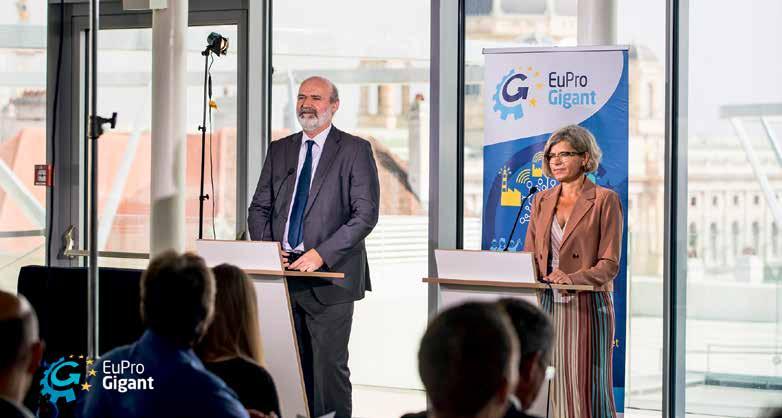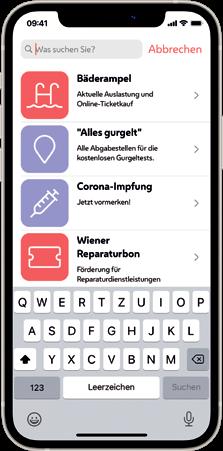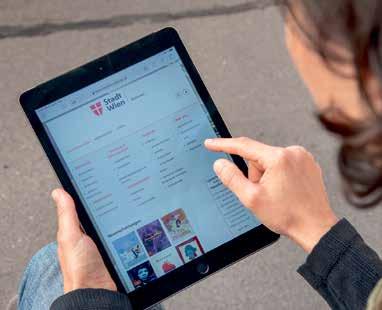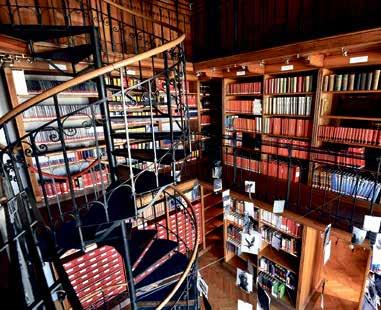
11 minute read
A factory in Vienna turns simple data into smart data
by medianet
The project EuProGigant has moved into gears and The Pilot Factory 4.0 of the Vienna University of Technology is one of its drivers.
The Pilot Factory 4.0 of the Vienna University of Technology (TU Wien) is working on a European production giganet, the EuProGigant, turning big data into small data and making industrial production even smarter. The binational project was presented in late June in Vienna and Berlin. The project executing organisation, projects and Ministries from Austria and Germany underlined the significance of this project for the digital transformation. 16 project partners are cooperating at EuProGigant in order to develop a data infrastructure that makes Europe’s production and manufacturing sector stronger, more efficient, more resilient and more sustainable. They include small and medium-sized enterprises, large corporations, universities and research facilities.
Advertisement
Big data in production
The amount of data grows while its usage is increasingly decentralised. There is still very little exchange in data between the various entities. But digital information comes mainly from the industrial sector as every machine and every sensor generate data. These huge amounts of data, that are often recorded in real-time, are called big data. However, we are not able to analyse and process them properly – yet. By processing this raw data and making it usable, we create smart data.
This smart data can be used, for example, to make global supply chains with low stock-keeping more resilient. Smart systems can also detect problems within the digital eco-system and tackle them when they have access to smart data. The project partners show how this data exchange can take place: “We connect pilot factories in Austria and Germany within EuProGigant in order to show what resilient value-added chains can look like,” says Claudia Schickling, head of the Pilot Factory 4.0 of the Vienna University of Technology. “We also want to offer SMEs easy and practical access to the digital learning eco-system of EuProGigant so they can learn the rules of digital production eco-systems and strengthen their competitiveness.” In order to achieve this, the project partners are trying to convince as many users as possible to use the new infrastructure and to help develop it.
© Matthias Heschl

Friedrich Bleicher, Head of the Institute for Production Engineering and Photonic Technologies at the Vienna University of Technology, and consortium head Claudia Schickling
One common goal
In order to establish EuProGigant Europe-wide it is important to work across borders right from the start. “Our mission as a University of Technology is to pave the way for new technologies along the value-added chain from fundamental research to applied research, creating space for innovation. We achieve this by constantly broadening our horizon and enter collaborations such as this one,” says Johannes Fröhlich, Vice-Dean for Research and Innovation at the Vienna University of Technology. “EuProGigant, our vision of a European production giganet, demonstrates clearly that we all – academics and businesses – can benefit from common structures. They are created best when we collaborate across borders and fields of study, sharing our knowledge.” To ensure that, EuProGigant will establish itself as a European production giganet among the various stakeholders; the project partners already coordinate their efforts with the industrial sector and the science sector.
About EuProGigant and its goals
The binational project EuProGigant with a total volume of 8.6 million euros was launched in March 2021. The aim is to create four compendiums, finish the industrial development and the demonstration phase by February 2025. The Federal Ministry for
EuProGigant project partners
SMEs, big players, universities and research facilities joined forces for smart data: c A1 Digital International GmbH – Exoscale c Arburg GmbH + Co KG c Brinkhaus GmbH c Concircle Management Consulting GmbH c Craftworks GmbH c EIT Manufacturing CLC Central Gmbh c EIT Manufacturing CLC East Gmbh c Gebr. Heller Maschinenfabrik GmbH c IGH Infotec AG c MTU Areo Engines AG c Pilotfabrik Industrie 4.0 TU Wien c Plasser & Theurer GmbH c PTW TU Darmstadt c Software AG c Stark Spannsysteme GmbH c WFL Millturn Technologies GmbH & Co. KG
Climate Action, Environment, Energy, Mobility, Innovation and Technology (BMK), the Austrian Research Promotion Agency FFG and the German Federal Ministry for Economic Affairs and Energy (BMWi) are subsidising the project with 5 million euros. The Austrian-German project EuProGigant is also a lighthouse project for GAIA-X in a production environment.
The aim is to demonstrate and scale a multi-site digitally networked production ecosystem with resilient, data-driven and sustainable value creation to strengthen European industry. The speed and flexibility of value creation by implementing the technical architecture of the data ecosystem in the sense of GAIA-X will be demonstrated. The unique selling point of the approach is the creation of a European knowledge database as a platform for long-term secure and sovereign holistic data management in the cloud. To connect machines to the platform, a vertical integration solution will be created, taking into account the interfaces between machines, tool and clamping systems, edge devices, on-premise solutions and ERP/MES systems.
Developed intelligent data connectors are used to aggregate and pre-process data to differentiate between Smart Data and Big Data. The calamity-reducing effects and resilience are verified by means of a stress test to evaluate the data-driven production. At the end of the project, digital services will be available via GAIA-X, which will control the self-orchestration of the data and be able to compensate and adjust for disturbance variables. To exploit the results, the European knowledge database and the vertical integration solution developed will be made available to companies and research institutions, including digital services.

What is GAIA-X?
With GAIA-X, representatives from business, science and politics on a European level create a proposal for the next generation of a European data infrastructure: a secure, federated system that meets the highest standards of digital sovereignty while promoting innovation. This project is the cradle of an open, transparent digital eco-system, where data and services can be made available, collated and shared in an environment of trust.
GAIA-X is a project initiated by Europe for Europe and beyond. Its aim is to develop common requirements for a European data infrastructure. Therefore openness, transparency and the ability to connect to other European countries are central to GAIA-X. Representatives from several European countries and further international partners are currently involved in the pro-

ject. The participants want to invite other European and international partners to join the project and to contribute to its development. Many dialogues are already underway and will be further intensified. Furthermore, GAIA-X is in continuous exchange with the European Commission.
Europe makes extensive investments in digital technologies and innovative business models. The idea is to ensure that those who drive innovations forward are also those who benefit in economic terms. This will help to secure value creation and employment in Europe.
An open digital eco-system is needed to enable European companies and business models to compete globally. This eco-system should allow both the digital sovereignty of cloud services users and the scalability of European cloud providers.
Within GAIA-X, the project partners are developing the foundations for a federated, open data infrastructure based on European values. GAIA-X connects centralised and decentralised infrastructures in order to turn them into a homogeneous, user-friendly system. The resulting federated form of data infrastructure strengthens the ability to both access and share data securely and confidently. ◆
GAIA-X at a glance
The aim of GAIA-X is to develop common standards and interfaces for a European data infrastructure and to create an innovation platform. Therefore, openness, transparency and the ability to connect to other European countries are central to GAIA-X.
Goals of the initiative “GAIA-X for the City of Vienna”
c Provision of the GAIA-X standard r for (cloud-based) data services r for the urban data region Vienna (date usage with businesses, science and research) r in the Data Excellence Strategy 2021 of the City of Vienna
c Developing a technological and methodical eco-system to accelerate the data-driven digital transformation in Vienna under consideration of data sovereignty
c Using open-source principles
A digital hello from Vienna with Viennese online services
The City of Vienna’s online offer is quite far-reaching: A lot can be done at the click of a mouse from home. Now the City has its own podcast. Now it is up to you to use these services.
Informed in Vienna – of course digitally via newsletter and app MEIN WIEN heute – the most important news of the day from and around the City Hall every morning in your email inbox. The daily newsletter of City Hall Communications offers an overview of the most important topics from the City of Vienna. Subscribers of “MEIN WIEN heute” receive a compact overview of the current topics from the City’s policies, culture, economy and a preview of the day’s most important dates straight to their inbox, every day from Monday to Friday – free of charge, of course.
Subscribe to the newsletter at www.wien.gv.at/meinwienheute

City of Vienna’s app
The popular Stadt Wien App offers the right information at the right time for all of those that live in Vienna. Ranging from realtime information to a city map and a digital bonus pass. The central search field leads to all information from the city’s administration from A to Z. The smart services of the WienBot are also onboard. It knows the answers to more than 1,000 questions. Download now for free for Android or iOS.
The City of Vienna Podcast
In addition to the City’s multimedia offer there is also the City of Vienna Podcast. What makes the city of Vienna’s podcast so distinguished: It delivers high quality content with added value, lets Viennese people have their unfiltered say and is dedicated to the city’s most important topics. The city of Vienna podcast is arranged in ‘seasons’ similar to the ‘seasons’ on Netflix et al. and goes in search of voices of the city. For example, in one episode the people of Vienna’s questions about the coronavirus are tackled, including a fact check.
The podcast is available as a free subscription on all popular audio platforms such as Apple, Android/Google, Spotify, Deezer and more. Subscribe now! More info: wien.gv.at/podcast
Borrow books online
For more than ten years the City of Vienna’s libraries have been offering the opportunity to borrow digital media around the clock. Currently, the libraries offer 80,000 digital titles ranging from current novels, thrillers and literature classics through to literature for children and youths as well as non-fiction and reference books. There is also a range of magazines available covering topics such as art, travel, politics, music, technology, IT, lifestyle and handicrafts as well as daily newspapers. Since 2018, the virtual library also offers eLearning classes. There are over 1,500 training videos on offer, which can be borrowed anytime for both professional and private further education. The Overdrive eLibrary offers around 9,500 English language eBooks and digital audiobooks (English and German). Every month there are on average 65,000 downloads in the virtual library and around 6,000 downloads in the Overdrive eLibrary.
The Virtual Library and Overdrive eLibrary collections are continuously being expanded, with at least 500 new titles being added each month. The digital media can be accessed in any location with Internet access at the click of a mouse and can be used on a wide range of devices. Free apps are available to increase the reading and listening pleasure of the user on tablets


and smartphones. A big advantage is the automatic return feature that avoids customers racking up late fees. This service is available free-of-charge to all customers with a valid library pass. For more information: buechereien.wien.gv.at
Digital innovation at the Vienna Library in the City Hall
The Vienna Library located at the City Hall is one of the three largest academic libraries in Vienna alongside the Austrian National Library and the Vienna University Library. It holds 650,000 volumes, 1,400 bequests, 250,000 catalogued individual autographs in the manuscript collection and almost 100,000 music manuscripts and around 350,000 posters. This extensive offer is now available to all via the new virtual channels. As if that were not enough, the digitisation of the Vienna Library in the City Hall is continuously being worked on.
In the meantime, more than 120,000 documents from the unique collection are available online. By 2025, you will be able to access 500,000 documents online, including a further 260,000 manuscripts and 120,000 posters, books and photos. When possible, the valuable documents will be captioned with full texts. For the text recognition, artificial intelligence will be used as part of a cooperation with the University of Innsbruck.
One of the latest major projects, for example, makes Franz Grillparzer’s entire estate digitally accessible. Thanks to new technologies and digital archives, the library is an ideal situation to support research. More information (incl. topic search by keyword): digital.wienbibliothek.at
New: Digital building applications
The vast majority of construction companies and architectural firms have for a long time been preparing their building applications – a total of around 13,000 per year – digitally. Now, digital building applications are available to the people of Vienna with expanded options: The documents can not only be submitted online via mein.wien.gv.at and processed electronically by the building inspectors. Now the entire process – from submission to completion – can be done digitally, too. The digital building application means that the authorities no longer need paper copies of the plans. The inspection of files in the ongoing process can now be conveniently carried out online. For the use of the service electronic delivery and authentication is required; the documents are signed by the digital signature of the authorised author. For more information: mein.wien.gv.at/meine-amtswege

© Chrsitiam Jobst










